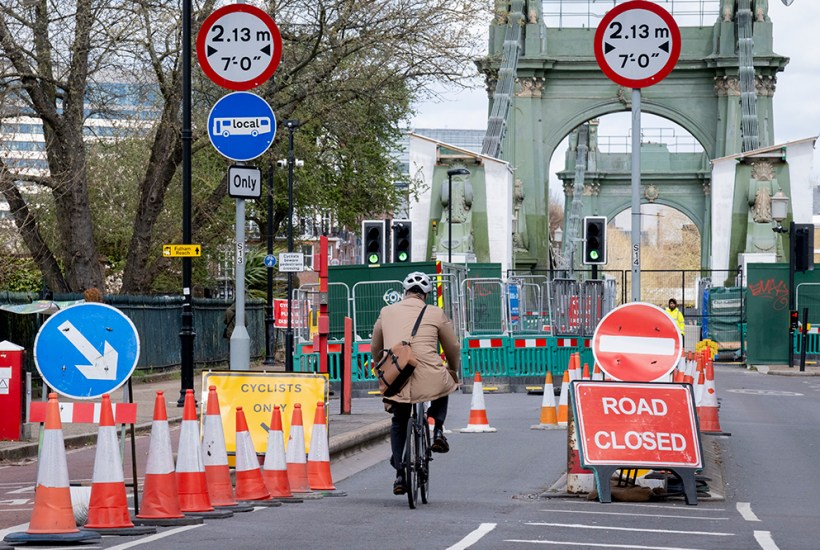Last month India managed to land a spacecraft on the moon for a third of the price of refurbishing Hammersmith Bridge. This startling fact captures both New Delhi’s efficiency and the staggering incompetence of our local councils.
It took two years and £9 million (in real terms) to build the bridge. It is set to cost almost £200 million to spruce it up and the work may not be complete until 2030. Hammersmith Bridge has become the perfect metaphor for what’s gone wrong with government: the carelessness, inertia and lack of concern for public money that is rife across the country.
The bill for doing up Croydon council’s headquarters was greater per square metre than that for building the Shard, Britain’s tallest skyscraper. Croydon has gone bust three times in the past two years, each time issuing a Section 114 notice, the closest a council can come to bankruptcy. An independent review found that Croydon was led by people who ‘avoid unwelcome and inconvenient feedback’ and ‘failed to focus’ on the budgetary crisis engulfing them. Jo Negrini, the council’s chief executive, walked away with a £437,000 payout.
This week it was the turn of Birmingham council to go pop. It had prevaricated for years about the £760 million it owed women who were wrongly denied bonuses that were paid to their male counterparts. It should be no surprise to anyone that the city went bust. For decades, it has been mis-served by the largest, most sprawling council in Europe whereas Manchester has thrived under a selection of smaller, more nimble local authorities. Birmingham council should be broken up, rather than bailed out, and given new leadership.
Birmingham is Labour-run, but this is not a party political issue. Woking council filed for bankruptcy in June after its own bizarre skyscraper building programme left it with a £1.2 billion deficit. The Tories began this mess and the succeeding Liberal Democrat council only made it worse.
Tory-run Thurrock council declared bankruptcy last December after its disastrous commercial property investments left it with a £470 million deficit which was then the largest in the history of local government. An inquiry found ‘dereliction in political and managerial leadership, inadequate governance arrangements and serious weaknesses in internal control’. There are all too many similar examples.
Between 2016 and 2019 the Conservative government allowed a 14-fold increase in council borrowing for commercial property acquisitions. Most of England’s 318 councils sat out this madness, but 50 of them accounted for 80 per cent of the property spending. Councils, whose central government funding has been cut in half in real terms since 2010, imagined they could make ingenious investments using borrowed money. They failed spectacularly. Any commercial lender would have refused to finance such deranged plans, but councils borrowed from a special fund run by the Treasury. Where was the oversight? Such irresponsible financial decisions mean taxpayers fail to receive the services they desperately need and pay for. No wonder people are angry. They have every reason to be.
Householders in Croydon have withheld their council tax in protest at the council’s failure to empty their bins, and the mood hardens against central government. But there are lots more council bankruptcies in the offing. A recent survey of all English local authorities found that only one in five could confidently predict that it will survive the next year.
The usual response when corruption in Whitehall is exposed is to declare that government is too centralised, and that what we really need is to devolve power to the town halls and to the Scottish and Welsh administrations. There is talk of reviving Joseph Chamberlain-style localism. But the recent behaviour of local governments should inspire no one with confidence. There have been few examples of municipal excellence, and many cases of disastrous leaders using scant resources for their own vanity projects without thought for the people they serve.
It was a dismal sign of their reluctance to serve the public that local councils were the first to shut down services during the pandemic and the last to open them back up again. Playgrounds too often remained shut, vital outdoor places unmanned and unusable, though there was not a shred of scientific evidence that the virus could be transmitted outdoors. Footbridges were closed on the grounds that people might pass each other on them.
When Tory-run Northamptonshire effectively declared itself bankrupt in 2018, it was the first authority to do so in 20 years. Since then local councils have toppled like dominoes: Croydon, Slough, Nottingham, Northumberland. Birmingham is simply the biggest. The expectation is that Rishi Sunak will step in, as he did during the pandemic. Birmingham is too big to fail.
Perhaps the most depressing part of this saga is that it doesn’t seem to matter who holds power. Tory councils have been going bust as readily as Labour ones. We can expect municipal bankruptcy to be added to the list of everyday governmental dysfunctions and, as Kate Andrews argues in the cover story, no politician seems to have the will to stop the rot. More money will be borrowed or printed, and the cycle will continue.
Got something to add? Join the discussion and comment below.
Get 10 issues for just $10
Subscribe to The Spectator Australia today for the next 10 magazine issues, plus full online access, for just $10.
You might disagree with half of it, but you’ll enjoy reading all of it. Try your first month for free, then just $2 a week for the remainder of your first year.














Comments
Don't miss out
Join the conversation with other Spectator Australia readers. Subscribe to leave a comment.
SUBSCRIBEAlready a subscriber? Log in